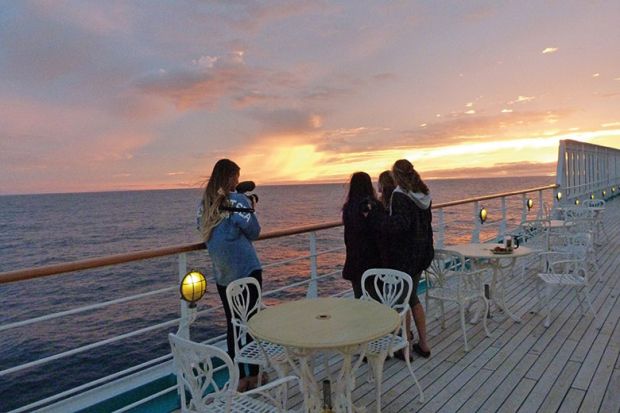“There’s darkness and then there’s being on a ship in the middle of the Pacific Ocean where looking out from the deck all you see is inky blackness. No shadows, twinkly lights, airplanes. Just the dark. I wonder if that’s what it is like in space?!”
So reads a diary entry from 14 January 2018 by Diane Holt, professor of management and marketing at the University of Essex’s Business School, who at the time was nine days into Semester at Sea – a study abroad programme that takes students and academics on a 104-day voyage across the world.
She was 3,190 nautical miles to the next port in Kobe, Japan, had already stopped off in Hawaii and would take in China, Hong Kong, Vietnam, Cambodia, Myanmar, India, Mauritius, South Africa, Ghana and Morocco over the next three months.
Semester at Sea, which is managed by the US-based Institute of Shipboard Education and currently sponsored by Colorado State University, was founded in 1963.
Fees range from $25,000 (£18,418) to $31,000, depending on the type of cabin that students choose. The choice of courses on each trip is dictated by the academics on board – prospective lecturers apply for the programme, stating which modules from CSU’s curriculum they could teach.
Last month, the programme, which takes place aboard a German ship called the MV World Odyssey, completed its 124th voyage, carrying 534 students, 14 lifelong learners, 58 faculty and staff and 29 of their family members, and 177 crew on board. The students came from 193 different institutions from 47 states in the US and 33 other nations.
All formal teaching takes place on the ship, with social spaces such as restaurants, theatres and terraces transformed into classrooms. The stop-offs comprise field trips, allowing academics to “weave the port experiences, and the experience of being in different contexts and cultures, into what you’re doing in the classroom”, said Professor Holt, who was one of just three UK passport holders, and the only British academic, on the latest trip.
“It gives a level of richness to [teaching] that is really difficult to do without experiential fieldwork,” she added.
As part of her classes on supply chain management, leadership and social responsibility, and sustainable and social ventures, Professor Holt arranged trips to a cacao farm in Hawaii, a stingless bee project in Ghana and coconut producers in Vietnam.
She also had time to fit in her own research during the trips, helped by “leveraging the contacts” that the programme has in those regions, as well as submitting two journal papers and writing grant bids totalling £750,000 while on board.
Of course, teaching and conducting research on board a ship does not come without its challenges.
There is no internet or mobile phone reception at sea so all resources must be downloaded in advance of the trip, said Professor Holt, adding that the ship has a small library with teaching materials and academics can access a “seamail” email account.
But there are undoubted benefits, too. The “experiential” nature of the trip, as well as the lack of internet, means that the students and faculty share some “key intense experiences together” and become “very close, very quick”, said Professor Holt.
“Classes don’t finish when the room empties – they carry on all the time,” she added.
One might think that such an experience would be less relevant today than when the programme started, given that it is now much easier and cheaper to go abroad and universities provide many opportunities for students and scholars to study and work internationally.
But Professor Holt believes that the initiative has more relevance today.
“While the world has become easier to get around, often when you study abroad you go to one place. This allows you to compare the places that you go to,” she said.
She added that the sea experience also means that there is lots of time for students and staff to reflect on the different cultures and contexts they encountered during the voyage and “to anchor it in something that you’re experiencing all together”, which adds to the learning experience.
And for today’s students, “who are the social media generation and the smartphone generation”, it is “really important for them to cut themselves off from [technology] for a while and…learn to sit and talk to each other”, she continued.
Professor Holt said that she “benefited from [the trip] as much as the students” and that the experience has already had an impact on her teaching.
“A lot of people say being on Semester at Sea makes you a better teacher and I think that’s true. I think that it helps you to reconnect with young people, to understand more about them because you become quite close to them,” she said.
“They had a transformative experience and so did I.”
POSTSCRIPT:
Print headline: Floating campus teaches students ‘how to converse’
Register to continue
Why register?
- Registration is free and only takes a moment
- Once registered, you can read 3 articles a month
- Sign up for our newsletter
Subscribe
Or subscribe for unlimited access to:
- Unlimited access to news, views, insights & reviews
- Digital editions
- Digital access to THE’s university and college rankings analysis
Already registered or a current subscriber?








